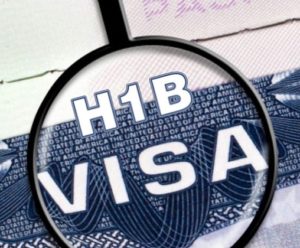In a move that may affect the Indian IT companies such as TCS, Infosys and etc, the US President Donald Trump’s government has made new H-1B Visa rules tougher. The new policy makes very tough the procedure of issuing H-1B visas to those to be employed at one or more third-party work sites, a development that will hugely impact Indian IT companies and their employees.
The new move announced yesterday through a seven-page policy empowers the US Citizenship and Immigration Services (USCIS) to issue H-1B visas to an employee only for the period for which he/she has work at a third-party worksite.
The latest policy memorandum is a part of President Donald Trump’s ‘Buy American and Hire American Executive Order’ and the directive to protect the interests of US workers, the USCIS said.
Indian IT companies, which are among the major beneficiaries of H-1B visas, has a significant number of its employees deployed at third-party worksites. A significant number of American banking, travel and commercial services depend on on-site IT workers from India to get their job done.
Effective immediately, the new guidance comes weeks ahead of the beginning of the H-1B visas filing season, which is expected to be April 2, for the fiscal year 2019 beginning October 1, 2018.
What are the new rules? Why are they tough?
As per the new policy, a company will have to furnish the absolute necessity of the H-1B applicant for a “specialty occupation.” They will have to assure that the H-1B beneficiary has been hired for a specific assignment that will last for a stipulated time-period specified in the petition.
Further, the employer has to declare that they will have a strict employer-employee relationship with the visa-holder.
Extensions get tougher
Further, ditching the practice of issuing H-1B visas for three years, the new visas could be for lesser period of time. Also, sometimes American companies end an employee’s contract abruptly. These workers, who temporarily don’t have work, are termed “benched employees.”
They hold H-1B visas but aren’t paid. US officials said this is illegal and abuse of the system. Visa extension for such employees would now be tough.
Intensive paper-work for companies
Additionally, companies seeking H-1B visas for employees at third-party sites face intensive paperwork during applications.
They need to give evidence of the work assignments, including technical documents, cost-benefit analysis, etc.
Further, detailed description of the beneficiary’s special duties, duration, salary, hours worked, benefits, supervisor’s details will have to be furnished.
Stringent Rules for companies of beneficiaries
Besides, there are stringent rules for a company applying to extend the H-1B employment for a beneficiary placed at one or more third-party work sites.
If the beneficiary’s past employment is with the same employer, then it should be proved that all H-1B requirements were met for the earlier approval period.
But, if these conditions aren’t met, it risks the beneficiary’s visa.
PS: On the whole, Indian IT firms such as TCS, Infosys, Wipro and others are likely to be hit due to the new policy of H-1B visas.






